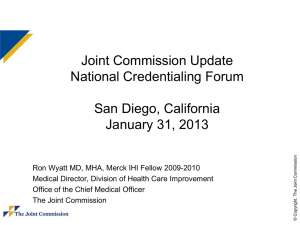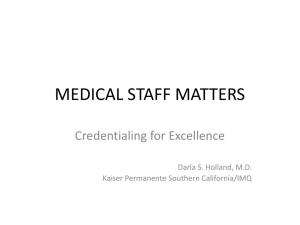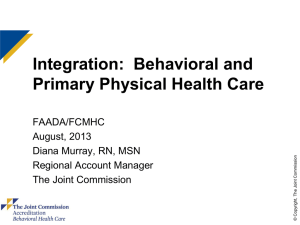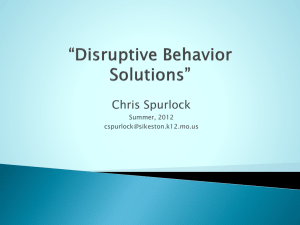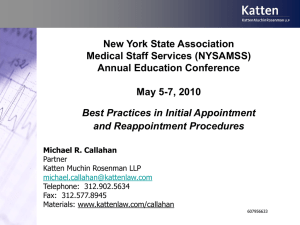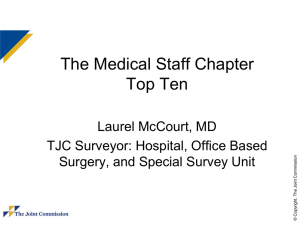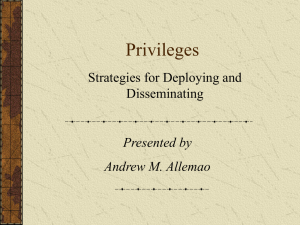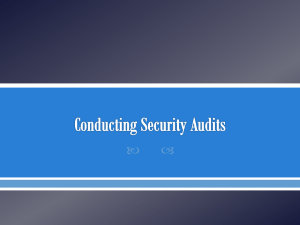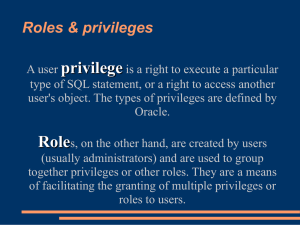TJC NCF 2014
advertisement
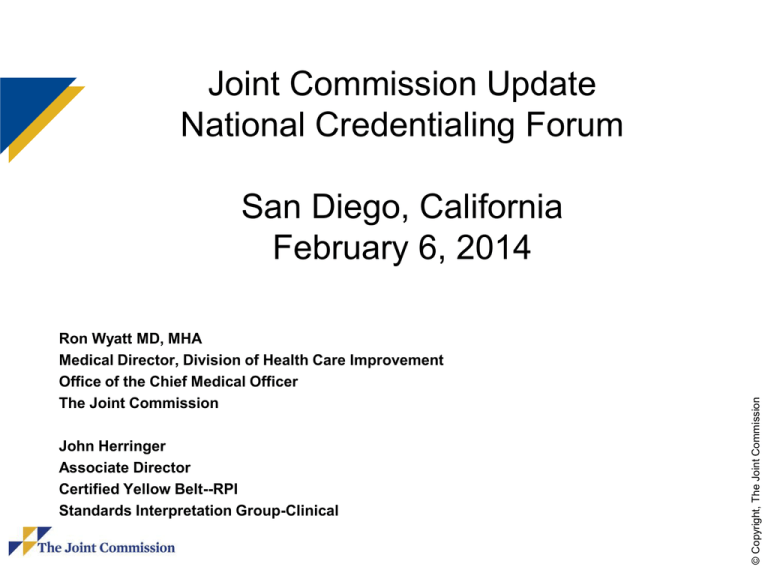
Joint Commission Update National Credentialing Forum Ron Wyatt MD, MHA Medical Director, Division of Health Care Improvement Office of the Chief Medical Officer The Joint Commission John Herringer Associate Director Certified Yellow Belt--RPI Standards Interpretation Group-Clinical © Copyright, The Joint Commission San Diego, California February 6, 2014 Objectives 2. Share best practices in the area of OPPE/FPPE that participants can use in their organizations. Client name/ Presentation Name/ 12pt - 2 © Copyright, The Joint Commission 1. Briefly discuss the Joint Commission standards that relate to credentialing, privileging and OPPE and FPPE of Licensed Independent Practitioners. © Copyright, The Joint Commission Client name/ Presentation Name/ 12pt - 3 Source: IHI Forum 2012 Competing Demands on LIP Time Organization Regulatory Joint Commission OPPE Clinic/Unit Patient Needs Optimize the patient experience Individual Physician Professional Needs MOC, CME Source: University of Wisconsin Health Client name/ Presentation Name/ 12pt - 4 © Copyright, The Joint Commission Clinical care, patient experience and operational performance Credentialing and Privileging Utilization of three concepts to allow the organized medical staff to conduct a more comprehensive evaluation of a practitioner’s professional performance Client name/ Presentation Name/ 12pt - 5 © Copyright, The Joint Commission 2007 MS Chapter introduced 3 new concepts Process involving a series of activities designed to collect, verify, and evaluate data relevant to a practitioner’s professional performance Serves as a foundation for objective, evidence-based decisions regarding appointment to the medical staff, and recommendations to grant or deny initial and renewed privileges Client name/ Presentation Name/ 12pt - 6 © Copyright, The Joint Commission Joint Commission Credentialing and Privileging The ACGME and the ABMS jointly developed six areas in which a physician must be competent: The six competencies are a recommended framework by The Joint Commission…not a requirement Client name/ Presentation Name/ 12pt - 7 © Copyright, The Joint Commission • Patient Care • Medical/Clinical Knowledge • System Based practice • Practice based learning • Communication skills • Professionalism Credentialing and Privileging • Focused • Ongoing Client name/ Presentation Name/ 12pt - 8 © Copyright, The Joint Commission Professional Practice Evaluation Purpose Align competency expectations to those used by ACGME training programs OPPE – Require organizations to review performance data for all practitioners with privileges on an ongoing basis rather than the two year reappointment process and thus allow them to take the appropriate steps to improve performance on a more timely basis – Require organizations to establish a process to evaluate the specific competence of all practitioners who do not have documented evidence of competency performing the privileges at the organization (e.g. new appointees, new privileges for current staff) – Process to evaluate a current privileged practitioner’s ability to provide safe, high quality patient care. Client name/ Presentation Name/ 12pt - 9 © Copyright, The Joint Commission FPPE OPPE Expectations EP1 - There is a clearly defined process in place that facilitates the evaluation of each practitioner’s professional practice. (A) This clearly defined process must include but is not limited to: – Who will be responsible for reviewing the data? – – – – Department and/or Department Chair Credentials Committee Medical Executive Committee (MEC) Special Committee of the Medical Staff (e.g. “aka peer review”) – The frequency must be defined in the policy (e.g. 3,6,9 months) – IMPORTANT- Once every 12 months is periodic rather than ongoing! – How are the data incorporated into the credential files? – This data need not be continuously stored in the credential file – However, the decision resulting from the review, whether it be to take an action or continue the privilege, would need to be documented and included in the practitioner’s credential file Client name/ Presentation Name/ 12pt - 10 © Copyright, The Joint Commission – How often are the data reviewed? OPPE Expectations – The type of data collected is the organization’s choice – The data should be tailored to specialties and/or practitioners – The six areas of “General Competencies” may be used as a template for data stratification – but not required – Client name/ Presentation Name/ 12pt - 11 © Copyright, The Joint Commission EP2 – The type of data to be collected is determined by the individual departments and approved by the organized medical staff (A) – The type of data to be collected and the approval process needs to be defined – Data Examples of Data OPPE Expectations Discussion with other individuals involved in the care of each patient - other practitioners, NP, PA, Surgical Assistants, Nursing, Ancillary Support Staff Prospective Analysis – treatment conferences Client name/ Presentation Name/ 12pt - 12 © Copyright, The Joint Commission Ongoing Chart Review Direct Observation Peer Evaluations Monitoring of diagnostic and treatment techniques Data collection must be completed for all practitioners who are Medical or Professional Staff MembersActive, Courtesy, Consulting, Allied Health, etc. Zero data are in fact data – a zero rate may be good for complications but not good in that the practitioner has not performed a procedure in the last two years There is no requirement that the data must be provided to the practitioner, and …. The data and analysis does not need to be contained in the credential file Client name/ Presentation Name/ 12pt - 13 © Copyright, The Joint Commission Data Analysis When possible, display the performance of one practitioner against the performance of the others. The hospital’s responsibility is to collect and display the data in such a manner that the medical staff can make decisions about performance – “Actionable Information” Action is taken as issues arise, not just at the twoyear reappointment When possible, let one page “tell the story” of a physician, or a department Client name/ Presentation Name/ 12pt - 14 © Copyright, The Joint Commission Organizing and Displaying OPPE Data Take Home Points Periodically (at least at reappointment) it’s helpful to generate the volumes of each procedure or DRG to assure the medical staff that there are not areas of ‘zero volume’ creeping into categories of privileges Client name/ Presentation Name/ 12pt - 15 © Copyright, The Joint Commission In OPPE, you’re only capturing data on a few indicators or flags of quality. FPPE – EP1 A period of focused professional practice is implemented for all initially requested privileges – EP3 The performance monitoring process is clearly defined and includes each of the following: – Criteria for conducting performance monitoring – Method for establishing a monitoring plan specific to the requested privilege – Method for determining the duration of performance monitoring – Circumstances under which monitoring by an external party is required Client name/ Presentation Name/ 12pt - 16 © Copyright, The Joint Commission New Privileges Focused Review for New Privileges Example – electronic data Various categories of privileges can move out of FPPE while leaving other privileges still to be reviewed under FPPE once exercised – Client name/ Presentation Name/ 12pt - 17 © Copyright, The Joint Commission Though all privileges must be part of the review, the medical staff can review those completed during the FPPE period and assess them as equivalent to those not yet exercised, and therefore OK…. or not Focused Review for New Privileges Example – electronic data – Mortality and morbidity – Surgical outcomes and events – Length of Stay and Readmissions – Volumes of each procedure or each DRG Client name/ Presentation Name/ 12pt - 18 © Copyright, The Joint Commission Think about using broad clinical indicators that capture the population served by this practitioner – tie to each privilege The OPPE-FPPE Connection EP2 The organized medical staff develops criteria to be used for evaluating the performance of practitioners when issues affecting the provision of safe, high quality patient care are identified Client name/ Presentation Name/ 12pt - 19 © Copyright, The Joint Commission – This EP links OPPE performance findings with the processes defined in FPPE Focused Review for New Privileges You would at least want to check on their progress as often as OPPE. Client name/ Presentation Name/ 12pt - 20 © Copyright, The Joint Commission FPPE should occur quicker than OPPE (e.g., it shouldn’t last a year if OPPE is done every 6 months), BUT a new practitioner often doesn’t build a practice fast enough, or touch on all categories of their privileges soon enough, to really capture the essence of their practice Focused Review for New Privileges Example chart review – – – – – – – H & P timeliness? Required elements? Progress notes regularly? Required op notes? Signatures on verbal orders? Discharge summary? Presence of Do Not Use abbreviations? You decide Client name/ Presentation Name/ 12pt - 21 © Copyright, The Joint Commission Define what is reviewed in a record by a non-LIP if that will be part of the FPPE: Focused Review for New Privileges Example chart review – Quality of H & P? – Quality of progress notes? – Specialty-specific documentation? – Addressing abnormal diagnostics? – Appropriateness of procedures? – You decide Client name/ Presentation Name/ 12pt - 22 © Copyright, The Joint Commission Define what peer LIPs review in the record that touch on practice quality Focused Review for New Privileges Client name/ Presentation Name/ 12pt - 23 © Copyright, The Joint Commission For privileges new to the facility, the medical staff may have to go to an outside source for some safety and quality benchmarks – “evidence based” Focused Review for New Privileges Describe the process in general terms (does not have to be in bylaws) What kinds of data are you able to evaluate (your menu) – Outcomes? Complications? Clinical management? Technique? Who evaluates – Section Chief, MEC, Credentialing Committee? How long (quantity of procedures, admissions, or length of time) How the decision will be conveyed to the LIP Client name/ Presentation Name/ 12pt - 24 © Copyright, The Joint Commission What Method of evaluation is available to you (your menu) chart review, direct observation, statistical review, proctoring? In Summary FPPE is a brief period of looking at the basic safety and competence in exercising ALL privileges for new medical staff members Client name/ Presentation Name/ 12pt - 25 © Copyright, The Joint Commission OPPE is an ongoing period of looking at just a few indicators of quality for EACH practitioner – it touches on something he/she does, but not everything Client name/ Presentation Name/ 12pt - 26 © Copyright, The Joint Commission Questions? For Standards/NPSG question: – 630-792-5900, Option 6 or – http://www.jointcommission.org/Standards/ OnlineQuestionForm/ Pat Adamski Ron Wyatt – 630-792-5922 – rwyatt@jointcommission.org Client name/ Presentation Name/ 12pt - 27 © Copyright, The Joint Commission – 630-792-5964 – padamski@jointcommission.org The Joint Commission Disclaimer Statement These slides are only meant to be cue points, which were expounded upon verbally by the original presenter and are not meant to be comprehensive statements of standards interpretation or represent all the content of the presentation. Thus, care should be exercised in interpreting Joint Commission requirements based solely on the content of these slides. These slides are copyrighted and may not be further used, shared or distributed without permission of the original presenter or The Joint Commission. Client name/ Presentation Name/ 12pt - 28 © Copyright, The Joint Commission These slides are current as of January 26, 2014. The Joint Commission reserves the right to change the content of the information, as appropriate.
